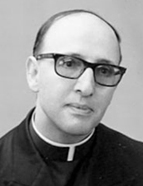

Within the scope of his academic trajectory and intellectual output, the abundance and regularity of his study trips, as well as his advanced mastery of a broad spectrum of dead and living languages are noteworthy. His study trips began in the 1940s. The longest was initiated in 1946 with his trip to Granada. From 1950, after a stay in Namur, followed by a visit to the Society's main houses in Belgium and France in the summer of 1951, he grew accustomed to using the summer vacation period to deepen his knowledge. (“Antunes, Padre…” [“Antunes, Father…], Grande Enciclopédia…[Great Encyclopaedia], vol. 38, s.d. [undated], p. 437). It was mainly within the scope of university teaching that he embarked on numerous journeys, both solo, whenever possible for the purposes of research and bibliographical updating (the most well- known were to Belgium, France, Germany and the United Kingdom), with the sponsorship of the Instituto de Alta Cultura [Institute for Advanced Studies in Culture] or the Fundação Calouste Gulbenkian [Calouste Gulbenkian Foundation], and with students to places of historical and cultural interest (excursions to Asturias, Greece and Italy are documented). In any case, he usually capitalized on summer courses, participation in congresses or the official representation of the country abroad in the context of the mission of the Order or the University (Padre Manuel Antunes [Father Manuel Antunes], 1985, pp. 9-10).
As his former student Arnaldo do Espírito Santo recalls, Manuel Antunes had "perfect knowledge of Greek and Latin, of the classical authors in the original, and of a vast bibliography which was also read in the original, whether Spanish, French, Italian, English or German". Such erudition and up-to-date knowledge had a strong impact on the school culture of the Faculdade de Letras, since this professor "did not need to wait for a particular work (...) to be translated in order to read, analyse, comment or generate discussions and the confrontation of ideas". (Obra Completa…[Complete Works…], t. 1, vol. 1, 2007, p. 1). Moreover, he was assistant librarian in Soutelo and Granada, and in the Brotéria lodgings his room was known as a "cafarnaum of books", from which the intellectual would spring forth (Padre Manuel Antunes, 1985, p. 18; Um pedagogo…, 2011, pp. 100-101;).
From the 1950s, Antunes committed himself to three major activities: teaching, the priesthood and writing. Indeed, part of his life was also absorbed by his participation in the Brotéria journal. In 1955, he was appointed editor, in charge of the literary criticism and culture sections, and ten years later he became director and held this post from January 1965 to the end of 1982, with an interruption between 1972-1975, most likely due to strong pressure from censorship, and perhaps, as noted by Mário Sottomayor Cardia, resorting to a pseudonym in the masthead (Idem, p. 245).
